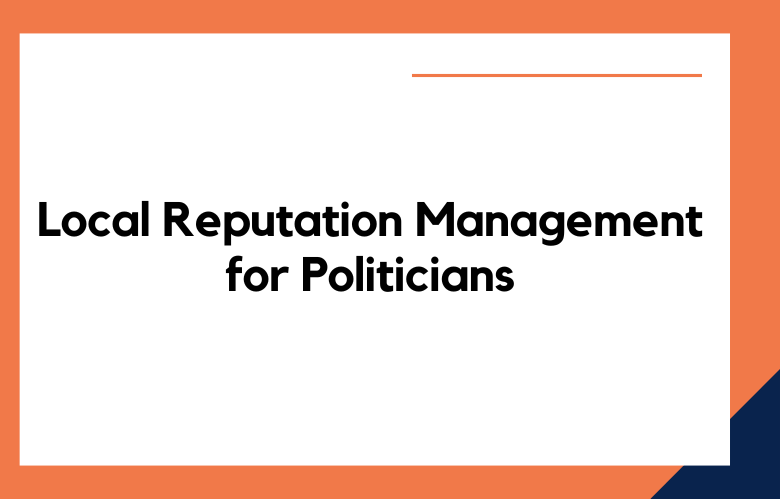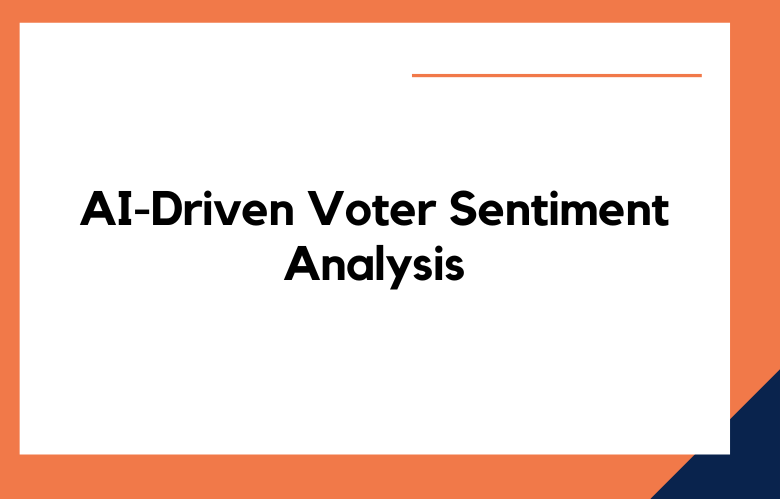Local reputation management is a critical component of success when running a campaign. Local reputation management helps politicians build trust with their constituents, Increase visibility in their district, and maintain a positive image.
Let’s take a closer look at how local reputation management can help politicians during their campaigns. As a politician, your reputation is your lifeblood. It’s a surprise that political figures are often the subject of intense public scrutiny, and it is essential to ensure that the public perception of you is positive and accurate.
The Importance of Local Reputation Management for Politicians
That’s why local reputation management is so important for politicians. Let’s look at how you can use reputation management to enhance your reputation in your local community.
In the digital age, where information travels at lightning speed and public perception can be shaped instantly, local reputation management has become a critical component of political strategy for politicians. While national issues may dominate headlines, the opinions and perceptions of constituents at the regional level often significantly impact electoral success and governance. As such, politicians must actively manage their reputation within their local communities to build trust, foster goodwill, and secure support.
In this exploration, we delve into the importance of local reputation management for politicians. By maintaining a positive presence in local media, engaging with constituents through community events and town hall meetings, and addressing local concerns and priorities, politicians can strengthen their ties to their constituents and enhance their credibility as influential leaders. Politicians can cultivate a positive reputation that resonates with voters and bolsters their electoral prospects through proactive communication and responsiveness to local issues.
Join us as we explore the intricacies of local reputation management for politicians, uncovering strategies and best practices for building and maintaining a solid reputation within local communities. By understanding the importance of local reputation management, politicians can position themselves for success in elections, governance, and public service, ensuring they remain connected and accountable to their constituents. Through a comprehensive analysis, we aim to shed light on the critical role of local reputation management in political strategy and its impact on the democratic process.
Essential Local Reputation Marketing Strategies for Political Campaigns.
Political campaigns that target a local audience must recognize the importance of building and managing an effective local reputation. To achieve success, candidates need to adopt the appropriate marketing strategies.
First, listening is essential. Candidates should actively monitor their online presence to understand what people say about them.
This includes tracking mentions on social media platforms and engaging with users who comment or post content related to the campaign. Candidates can identify potential issues and opportunities to build relationships with key stakeholders through careful listening.
Why is Local Reputation Marketing Critical for Political Success?
Local reputation marketing is critical for political success because it helps candidates build relationships with the people in their local area.
It allows them to get to know the members of their community and address their needs while also creating a positive brand image.
By engaging in local reputation marketing, politicians can be seen as trustworthy leaders and develop a sense of loyalty among the public.
This can be done through events, grassroots campaigns, and targeted digital marketing strategies such as social media posts or targeted ads.
In today’s digital world, ensuring local politicians have an effective online presence is more important than ever. A robust online presence can help garner more support from people who may not have heard about them through traditional means.
The Benefits of Local Reputation Marketing for Politicians.
Personal Connection:
One of the benefits of local reputation marketing for politicians is that it allows them to connect with voters on a personal level.
Politicians who focus on local reputation marketing try to get to know the people in their district and learn about the issues that matter to them. This personal connection can be a powerful tool in winning over voters.
Increased Visibility:
Another benefit of local reputation marketing for politicians is increasing their visibility in the community.
Politicians focusing on local reputation marketing try to attend community events and meet as many people as possible.
The increased visibility can help to build name recognition and make voters more likely to support a politician at election time.
Improved Image:
Local reputation marketing can also help improve a politician’s image in the community. Politicians who focus on local reputation marketing try to be seen as approachable and down-to-earth.
This improved image can make voters more likely to trust a politician and feel confident in their ability to represent their interests.
Stronger Support Base:
Local reputation marketing can also help politicians build a more robust support base in the community.
Politicians focusing on local reputation marketing try to connect with community leaders and opinion shapers. This solid support base can provide valuable endorsements and help a politician win over undecided voters.
Greater name recognition:
One of the main benefits of local reputation marketing for politicians is that it helps them gain greater name recognition in the community.
Politicians focusing on local reputation marketing try to attend as many community events as possible and meet as many people as possible. This increased name recognition can be a valuable asset come election time.
More effective use of resources:
Another benefit of local reputation marketing for politicians is allowing them to use their resources.
Politicians who focus on local reputation marketing typically have smaller campaign budgets than those who focus on national campaigns.
However, because they are targeting a smaller geographic area, they can more effectively use their resources and get their message out to voters.
More efficient use of time:
Another benefit of local reputation marketing for politicians is allowing them to use their time.
Politicians who focus on national campaigns often have to travel long distances and spend significant amounts of time away from home.
However, because they target a smaller geographic area, politicians focusing on local campaigns can spend more time meeting with constituents and less time traveling.
A greater understanding of issues:
Another benefit of local reputation marketing for politicians is that it allows them to understand better the issues facing their constituents.
Politicians focusing on national campaigns often have less time to meet members and learn about the issues that matter most to them.
However, because they are targeting a smaller geographic area, politicians focusing on local campaigns can spend more time meeting with constituents and learning about the issues that matter most to them.
How to Use Local Reputation Marketing to Build Trust with Your Constituents.
Local reputation marketing is an essential part of building trust with constituents. One of the best ways to build trust with local branches is through customer reviews, testimonials, and case studies.
Allowing customers to leave honest feedback on their experiences gives them a sense of security that their opinions matter.
This can also create an opportunity for the business to improve its service or product based on customer insight, demonstrating that it values its patron’s input.
Collaboration with other businesses in the area is another way to use local reputation marketing to build trust with constituents.
This could include partnering with relevant organizations, sponsorships, and community events and initiatives.
The Dos and Don’t of Local Reputation Marketing for Politicians.
Dos:
Use social media networks to communicate with your constituents and reliably get feedback. This will help you understand the issues that matter most to them.
Create content (e.g., press releases, videos, etc.) tailored specifically for local audiences, as it will be more relevant and more likely to engage them.
Develop relationships with local businesses and organizations to build a network of supporters.
Prioritize staying involved in the community, attending local events, and meeting people face-to-face whenever possible.
Utilize search engine optimization (SEO) tactics to ensure your website content is visible on local search results pages so your message reaches the right people in your area.
Cultivate strong relationships with key influencers in the community, as they can speak highly of you and amplify your message among their networks.
Engage with other politicians running in the same race so you can stay informed about competitors’ strategies and tactics while also building consensus around shared goals or initiatives if possible. I don’t
Don’t:
Just focus on creating content; make sure you’re actually getting out there and interacting with people directly, too!
Don’t neglect small towns or rural areas when campaigning—these groups may be less visible, but their voices still deserve to be heard!
Don’t over-promote yourself – remain humble and don’t take credit for every successful outcome or project.
Remember the importance of honesty—you must be transparent about your policies, positions, and donations from outside sources.
Don’t rely solely on digital marketing efforts when connecting with voters – make sure you’re also attending events where constituents physically gather.
Remember that reputation isn’t just about what happens online—it’s also about what people say when they don’t go online! Make sure to listen closely to conversations happening offline as well.
Maximizing Your Local Reputation as a Political Candidate
Maximizing your local reputation as a political candidate requires an effective strategy that utilizes both online and offline tactics.
Focusing on building relationships within the local community and using every opportunity to contact local voters is essential.
On the online front, it is essential to create a presence across various social media channels such as Facebook, Twitter, Instagram, and YouTube.
Creating content that resonates with local audiences and engaging with them regularly will help to build relationships and establish your presence in the area.
It would help if you used search engine optimization techniques to ensure that when people in your district search for political candidates, they can easily find your website or social media accounts.
Building a Strong Online Reputation for Political Campaigns
Building a solid online reputation for political campaigns is essential to the success of any campaign.
Digital channels and platforms are increasingly becoming the go-to places for voters, donors, and activists to learn about candidates and their ideas. A solid online presence can mean the difference between a winning or losing campaign.
Firstly, it is essential to create an engaging website that makes it easy for users to engage with your platform; this should include interactive and social media accounts where you can post updates, share stories, and promote events.
Your website should be updated regularly with facts and data that support your cause while staying true to your values. A professional website design will help elevate the status of your campaign in the eyes of potential voters.
Effective Reputation Marketing Tactics for Local Political Races
One effective reputation marketing tactic for local political races is to create an online presence.
This should include a website and social media accounts on all major networks that feature content specific to the campaign.
The website should be visually appealing, easy to navigate, and contain helpful information about the candidate and their platform.
They should also feature content relevant to the campaign, such as updates, news stories, and opinion pieces from the candidate.
Social media is an essential tool for local political races because it can help build visibility by attempting to engage potential voters in conversations about issues that are important to them.
It can also be used to send out reminders about upcoming events and inform supporters about how they can get involved.
Top Tools and Techniques for Local Reputation Marketing in Politics
Politicians require a robust local reputation to ensure they remain in the good graces of their constituents. As such, reputation marketing has become critical to any successful political campaign. Here are some of the top tools and techniques for local reputation marketing in politics:
Content Marketing:
Political campaigns must produce content that resonates with local voters, including infographics, press releases, and videos.
This helps to create an online presence for the campaign and build a positive reputation for the candidate through storytelling. It gives them an invaluable platform to connect with their constituents on the issues important to them.
Social Media:
Social media is one of the most powerful tools for politicians to connect and build relationships with constituents.
Twitter, Facebook, Instagram, and YouTube provide excellent platforms for sharing content quickly and efficiently and interacting directly with voters on critical issues.
Online Advertising:
Online ads are a great way to spread awareness about an upcoming campaign or event related to a candidate’s message.
Ads can target specific demographics or locations to maximize potential voters’ engagement and garner support for a particular issue or candidate.
Influencer Marketing:
Politicians can leverage influencers in their local area who have large followings among their constituents to spread awareness about their campaign message on social media platforms and through traditional mediums such as television appearances or radio interviews.
This creates valuable word-of-mouth promotion, which can help spread awareness quickly among potential voters and increase trust in the ppolitician’smessage.
Public Relations:
Having good public relations is essential for any political campaign since it helps build credibility among potential voters by conveying messages that resonate strongly with them – either through news outlets or direct communications with constituents at events or rallies –
Communicating key points effectively while providing accurate information about an individual’s policies and ideas that could positively impact their lives should they be elected.
Conclusion:
Local reputation management plays a crucial role in any political campaign. It allows candidates to gain trust among potential voters, build visibility within their district, and establish relationships with entities that share similar goals or values.
Candidates must understand how powerful these tools can be to make the most of this essential part of launching a successful campaign. Doing so will ensure they have the best chance of winning over voters during election season!
Local reputation management is crucial for politicians looking to make a good impression in their community.
By monitoring their online presence, effectively managing negative press, and engaging with constituents remotely through various channels, they can ensure they remain well-liked by their members while maintaining a robust public image.
With the right strategies in place, politicians have the power to shape public opinion on their terms—and ultimately become more successful in their careers as a result!











